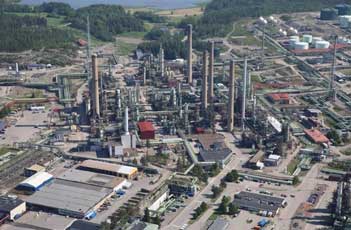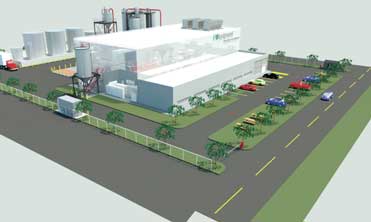Green news: Neste to go ahead with chemical recycling plant in Norway; Polystyvert to build commercial-scale recycling plant for PS in Canada

Sustainable materials firm Neste has made the final investment decision to commence construction of upgrading facilities for liquefied plastic waste at its Porvoo refinery in Finland. With the investment of EUR111 million, Neste will build the capacity to upgrade 150,000 tonnes/year of liquefied waste plastic. Upgrading is one of the three processing steps turning liquefied waste plastic into high-quality feedstock for new plastics: pretreatment, upgrading and refining. The investment is part of a broader project (PULSE), which has received an EU Innovation Fund grant of EUR135 million if fully implemented and is targeting a total capacity of 400,000 tonnes/year.
PULSE is Pretreatment and Upgrading of Liquefied waste plastic to Scale up circular Economy. Project PULSE is funded by the European Union. Views and opinions expressed are however those of the author(s) only and do not necessarily reflect those of the European Union or European Climate Infrastructure and Environment Executive Agency (CINEA). Neither the European Union nor the granting authority can be held responsible for them. Neste is the sole beneficiary of Project PULSE’s funding by the EU.
Pretreatment and upgrading of liquefied waste plastic play an important role in Neste’s approach to chemical recycling. They allow the company to increase flexibility for processing lower-quality plastic waste and scale up processing the liquefied waste plastic into high-quality petrochemical feedstock in its existing refinery in Porvoo.
“We have developed our capability to process circular raw material at the Porvoo refinery over the recent years and are now set to build a respective facility. The new facility processing 150,000 tonnes of liquefied waste plastic, is planned to be finalised in the first half of 2025,” states Markku Korvenranta, Executive Vice President in Neste’s Oil Products.
The project will see Neste building new assets at the Porvoo refinery, but also leveraging existing assets through retrofitting, to scale-up chemical recycling fast and efficiently. The upgraded liquefied waste plastic will then be processed in the conventional refinery in which it will replace a portion of the fossil resources processed at the Porvoo refinery.
Required preparation works at the Porvoo refinery were successfully completed during the first half of 2023, enabling the construction work to commence without any delay.

In other news, Canada’s Polystyvert has announced the construction of its first full-scale commercial plant to produce recycled polystyrene in Montreal. Representing an investment of C$40 million, this plant will recycle 9,000 tonnes/year of post-consumer and post-industrial polystyrene waste. This amount is equivalent to 15% of the PS buried in Quebec each year. Among the partners, it is important to note the participation of two blue-chip partners in the polystyrene industry who will contribute to the financing of the plant. The supply of raw materials is ensured, as well as the sale of recycled polystyrene.
Polystyvert’s patented technology addresses an essential need in waste management, namely the ability to recycle a material that was once considered difficult to recycle. Thanks to advanced purification, it is now possible to remove contaminants and produce high-quality plastic. This recycled plastic exhibits identical physical and chemical characteristics to virgin resin, while also allowing a reduction in greenhouse gas emissions of up to 90%. The recycled resin can be used to manufacture products intended for the same applications as virgin resin. In line with Quebec’s and Canada’s economic and environmental objectives, this transformative project benefits from the support of both levels of government.
"We are extremely proud to reach this crucial moment in Polystyvert’s history. After several successful development phases, our technology has reached maturity. We can now recycle contaminated waste with no other outlet than landfill sites. This plant is the first of many that can be built worldwide by replicating what will be done in Greater Montreal, thereby multiplying the economic and environmental benefits of the project." stated Nathalie Morin, President of Polystyvert.
This plant will accelerate the growth of the company, whose business model revolves around selling licenses for Polystyvert’s proprietary technology. As a result, the economic and environmental impacts of this first plant will be significant and far exceed the initial investment. This project will showcase Quebec and Canada on a global scale, demonstrating their leadership in the adoption and implementation of clean technologies.
"The full-scale plant we are announcing today marks the initiation of our technology’s global commercialization through licensing, a strategic move that will exponentially multiply the economic benefits of our project. We are already witnessing significant interest from key industry players eager to acquire licenses, paving the way for rapid company growth through the cloning of our first full-scale plant." stated Morin, President of Polystyvert.
In addition to its full-scale polystyrene recycling plant, Polystyvert is proud to announce the establishment of a new pilot plant at its research and development center located in the east of Montreal. The company has expanded its process and intellectual property to another styrenic plastic, ABS. This thermoplastic polymer is widely used in the automotive, electronics, and toy industries. With the financial support of a renowned global partner, Polystyvert has completed the initial stages of adapting its technology. The company is commencing the construction of a C$3 million pilot plant, which will be a significant step toward large-scale recycling of this plastic.
"Our research and development team has made considerable progress in adapting the technology to a type of plastic that is widely used in numerous applications in our daily lives. The installation of the ABS pilot plant in the east of Montreal marks a pivotal development stage in a new era of recycling for this plastic, which is currently poorly recycled but indispensable in its use. We are pleased to continue our growth in the east of Montreal," concluded Nathalie Morin.
(PRA)
Subscribe to Get the Latest Updates from PRA Please click here
©2023 Plastics and Rubber Asia. All rights reserved.

©2023 Plastics and Rubber Asia. All rights reserved.
Home Terms & Conditions Privacy Policy Webmail Site Map About Us















